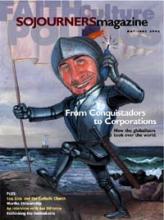"Come Mr. Tally Mon, tally me banana...." As I watched Life and Debt, a new documentary about the effects of international economic policies on Jamaica, the words of Harry Belafonte's classic "The Banana Boat Song" went through my head as the music played during the segment about Jamaica's beleaguered banana industry. It seemed cliché to use the song during that segment, and I braced myself when I heard the first notes begin.
But now I listened to the words, and they made sense for the first time. The lyrics struck me with their poignancy, and I realized that Belafonte's song was one of protest. I had never really heard them before, and rather than adding a trite touch to the film, the song revealed, through the understated display of the lyrics, one of the ways in which people of privilege have chosen to ignore the reality of Caribbean poverty.
Life and Debt, produced and directed by Stephanie Black, is a powerful indictment of the economic policies of the international financial institutions. The almost-90-minute film, which premiered at the 2001 Human Rights Watch Film Festival, focuses on the tragic inability of the island nation—granted independence in 1962 from Great Britain, but remaining within the commonwealth—to maintain a functional economy for its people.
In 1999-2000, according to Jubilee USA, the Jamaican government estimated that 66 percent of its revenue was being used for debt service. To raise more money, the government suggested increasing fuel taxes, which led to riots in the streets. The fuel tax option was withdrawn, and the country continues to deal with severe debt problems.
Read the Full Article
